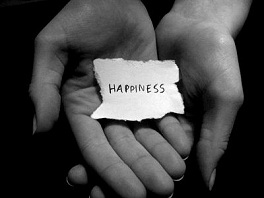Happiness – what is it?

Thomas Jefferson, in the Declaration of Independence, put the pursuit of happiness as one of the unalienable rights for human beings, on a par with life and liberty. Research on happiness presented in a paper by Luigino Bruni and Luca Stanca, University of Milan, gives some interesting insights.
Research based on this question: “Taking all things together, would you say you are very happy, quite happy, not very happy, or not at all happy?” has shown some interesting results: “In thirty surveys over 25 years (from 1946 to 1970 in the US) per capita real income rose by more than 60 per cent, but the proportion of people who rated themselves as “very happy”, “fairly happy” or “not too happy” remained almost unchanged. This finding is applicable to all the OECD countries where the aggregate happiness level has not risen in line with improvement in per capita real income”.
So why are we (US and the West) so obsessed with economic growth? Across poorer countries however, “there is a positive and strong correlation between GDP per capita and subjective well being”.
It is clear that once basic needs are met, the law of diminishing returns comes into play, and the happiness level becomes static.
The paper identifies that our happiness is not based on the acquisition of wealth but on “the gap between income and material aspirations. To the extent that aspirations rise together with income, subjective satisfaction may remain unchanged as income rises”.
The narrower the gap the more satisfied we are and the happier we become. This could be summed up by an old Arabic proverb: “Contentment is an inexhaustible treasure”.
We have become consumer junkies seduced by advertising into believing that if only we could have their latest product we would be happy, only to discover that the euphoria is transitory, lasting for only a short period of time. The effect is similar to that of a drug addict, needing another fix when the effects of the first dose have worn off.
The research identifies television as the main contributor to dissatisfaction, thus negatively influencing our happiness level. It “creates discontent by bombarding us with images of body shapes, riches and goods we do not have. It does this both in TV drama and in advertisements”. When one considers that “the average American family watches more than seven hours per day”, its enormous influence can then be appreciated.
The other factor that widens the gap of discontent is the obscene wealth gap that now exists between the ultra rich and the very poor. A government that is genuinely interested in the happiness of its population is one that addresses the wealth gap. This is particularly the case if it reaches a point where the basic needs of large numbers of people are not met, through unemployment, house repossessions and diminishing wages, as is the case in the US and Europe in the current economic climate. Significant improvements in happiness levels could be achieved for a modest increase in the income of the very poor.
The increase in US GDP over the years should have been used to narrow the wealth gap between the rich and poor, as this is a potent driver of dissatisfaction leading to unhappiness. Instead, we have seen the wealth of the super rich increases dramatically alongside poverty and impoverishment of third world proportions affecting a significant number of people in our societies. Combine that with television programmes showing the fabulous life style of billionaires, and advertising that tempts people to buy the latest ‘essential’ gadget, and the gap between income and material aspirations is forever becoming wider.
This dissatisfaction and unhappiness will eventually bubble to the surface in society with anti- social behaviour, crime and civil unrest that will make life uncomfortable and challenging for the rich and the middle classes, thus impacting negatively on the whole of society. How can I enjoy a theatre visit in London when I come out of the theatre and see people sleeping in shop doorways?
Raw capitalism is a voracious beast, devouring resources at an alarmingly unsustainable rate that is putting the happiness and the well being of future generations at great peril. A government serious about the happiness of its citizens needs to tame it, and limit its power by laws and regulations. A balance of power needs to be restored between capital and the “moneymen” on one side, and labour, physical and intellectual, on the other. The state should be involved in helping the poor and the needy to attain a basic standard that affords them human dignity compatible with a rich democratic society. Our collective humanity requires us to do that.

Reaching out to people of other cultures will enhance our self worth; it will develop and emphasize our empathy with other human beings and will, as a byproduct, improve the level of our happiness.
Let us be humble and learn from other societies that are poorer than us, yet seem to attain levels of satisfaction and happiness that are higher than in our societies (US and the West). We have been conditioned by advertisers and television to see happiness as consumption, acquiring the latest product, particular food, pair of jeans, and ‘L’Oreal, because you are worth it’.
Imagine the level of happiness that could be achieved by millions in the US and worldwide if the US spent one trillion dollars a year helping the poor and the destitute attain their basic need for food, clean water, and shelter. One trillion dollars is approximately the amount saved if the defence budget were to be cut by half, and all US wars brought to an end.
America, your wars violate every tenet of your Declaration of Independence: “that all men are created equal, that they are endowed by their creator with certain unalienable rights, that among these are Life, Liberty and the pursuit of Happiness”. For the sake of humanity, live up to these universal ideals.
That is the right and moral thing to do, and incidentally it happens to be a more powerful weapon against terrorism than armies and weapons of death and destruction.
___________________________________________________________________________________
Dr Adnan Al-Daini took early retirement in 2005 as a principal lecturer in Mechanical Engineering at a British University. His PhD in Mechanical Engineering is from Birmingham University, UK. He has published numerous applied scientific research papers covering heat transfer, fluid flow and energy utilization in many industrial applications. He is a British citizen born in Iraq. Since retirement he has devoted his time and energy to building bridges and understanding between minority communities, particularly the Muslim community and the wider community in the South West of England. He was Chair of Devon Racial Equality Council between 2007/8. Adnan is a contributing writer for the Huffington Post.
___________________________________________________________________________________
URL: http://www.a-w-i-p.com/index.php/2011/07/08/happiness-what-is-it
























